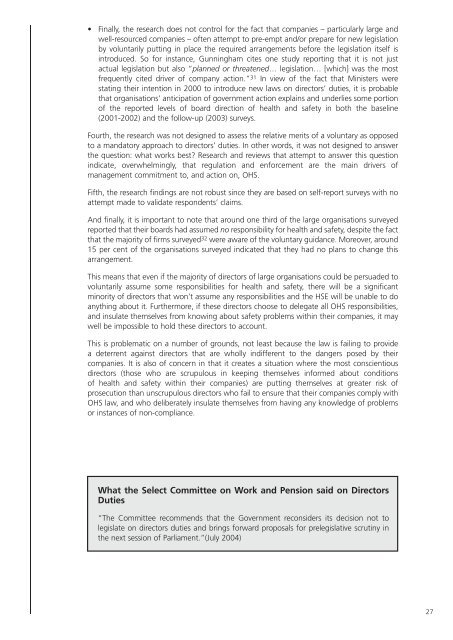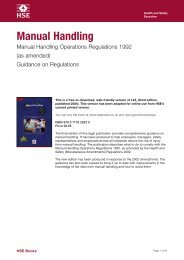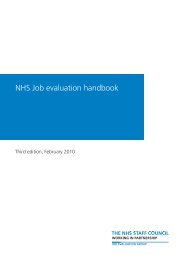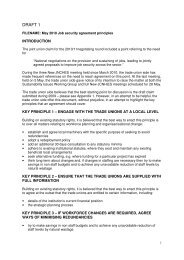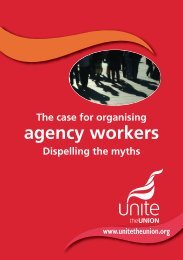Making Companies Safe - what works? (CCA ... - Unite the Union
Making Companies Safe - what works? (CCA ... - Unite the Union
Making Companies Safe - what works? (CCA ... - Unite the Union
You also want an ePaper? Increase the reach of your titles
YUMPU automatically turns print PDFs into web optimized ePapers that Google loves.
• Finally, <strong>the</strong> research does not control for <strong>the</strong> fact that companies – particularly large and<br />
well-resourced companies – often attempt to pre-empt and/or prepare for new legislation<br />
by voluntarily putting in place <strong>the</strong> required arrangements before <strong>the</strong> legislation itself is<br />
introduced. So for instance, Gunningham cites one study reporting that it is not just<br />
actual legislation but also “planned or threatened… legislation… [which] was <strong>the</strong> most<br />
frequently cited driver of company action.” 31 In view of <strong>the</strong> fact that Ministers were<br />
stating <strong>the</strong>ir intention in 2000 to introduce new laws on directors’ duties, it is probable<br />
that organisations’ anticipation of government action explains and underlies some portion<br />
of <strong>the</strong> reported levels of board direction of health and safety in both <strong>the</strong> baseline<br />
(2001-2002) and <strong>the</strong> follow-up (2003) surveys.<br />
Fourth, <strong>the</strong> research was not designed to assess <strong>the</strong> relative merits of a voluntary as opposed<br />
to a mandatory approach to directors’ duties. In o<strong>the</strong>r words, it was not designed to answer<br />
<strong>the</strong> question: <strong>what</strong> <strong>works</strong> best? Research and reviews that attempt to answer this question<br />
indicate, overwhelmingly, that regulation and enforcement are <strong>the</strong> main drivers of<br />
management commitment to, and action on, OHS.<br />
Fifth, <strong>the</strong> research findings are not robust since <strong>the</strong>y are based on self-report surveys with no<br />
attempt made to validate respondents’ claims.<br />
And finally, it is important to note that around one third of <strong>the</strong> large organisations surveyed<br />
reported that <strong>the</strong>ir boards had assumed no responsibility for health and safety, despite <strong>the</strong> fact<br />
that <strong>the</strong> majority of firms surveyed 32 were aware of <strong>the</strong> voluntary guidance. Moreover, around<br />
15 per cent of <strong>the</strong> organisations surveyed indicated that <strong>the</strong>y had no plans to change this<br />
arrangement.<br />
This means that even if <strong>the</strong> majority of directors of large organisations could be persuaded to<br />
voluntarily assume some responsibilities for health and safety, <strong>the</strong>re will be a significant<br />
minority of directors that won’t assume any responsibilities and <strong>the</strong> HSE will be unable to do<br />
anything about it. Fur<strong>the</strong>rmore, if <strong>the</strong>se directors choose to delegate all OHS responsibilities,<br />
and insulate <strong>the</strong>mselves from knowing about safety problems within <strong>the</strong>ir companies, it may<br />
well be impossible to hold <strong>the</strong>se directors to account.<br />
This is problematic on a number of grounds, not least because <strong>the</strong> law is failing to provide<br />
a deterrent against directors that are wholly indifferent to <strong>the</strong> dangers posed by <strong>the</strong>ir<br />
companies. It is also of concern in that it creates a situation where <strong>the</strong> most conscientious<br />
directors (those who are scrupulous in keeping <strong>the</strong>mselves informed about conditions<br />
of health and safety within <strong>the</strong>ir companies) are putting <strong>the</strong>mselves at greater risk of<br />
prosecution than unscrupulous directors who fail to ensure that <strong>the</strong>ir companies comply with<br />
OHS law, and who deliberately insulate <strong>the</strong>mselves from having any knowledge of problems<br />
or instances of non-compliance.<br />
What <strong>the</strong> Select Committee on Work and Pension said on Directors<br />
Duties<br />
“The Committee recommends that <strong>the</strong> Government reconsiders its decision not to<br />
legislate on directors duties and brings forward proposals for prelegislative scrutiny in<br />
<strong>the</strong> next session of Parliament.”(July 2004)<br />
27


